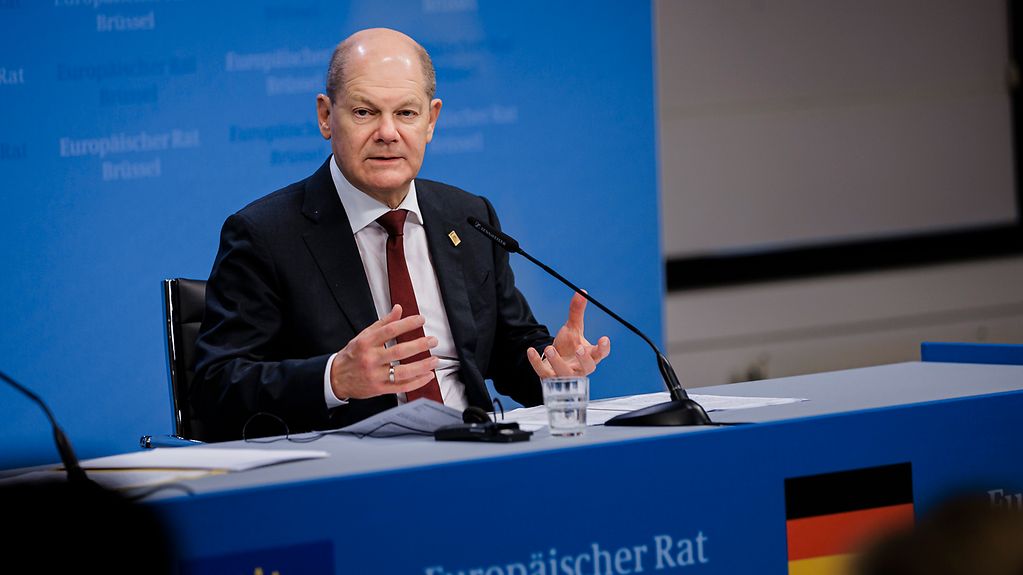European Council
The EU heads of state and government came together in Brussels for a meeting of the European Council. The central focus of the meeting was how to make Europe a carbon-neutral continent as rapidly as possible and how to secure its economic future. The situation in Ukraine was also discussed.
3 Min. Lesedauer

Federal Chancellor Scholz after the European Council meeting: "This is all good news for Europe."
Foto: Federal Government/Zahn
The European Council once again addressed the Russian offensive in Ukraine and the EU's continuing support for Ukraine. "The EU Member States will continue to provide support for as long as is necessary to defend Ukraine's integrity and sovereignty," said Federal Chancellor Olaf Scholz after the meeting. The Ukrainian President, Volodymyr Zelensky, who participated via video link, was once again assured of European solidarity. For example, the EU Member States discussed options for expanding the supply of ammunition to Ukraine in terms of financing and production capacities.
Federal Chancellor Olaf Scholz: "The way to end this war is also very obvious. Russia has to withdraw its troops. That is the prerequisite for a fair peace with Ukraine and preventing Russia from imposing its imperialist goals."
The heads of state and government also talked with the UN Secretary-General, António Guterres, about how the war was affecting food security as well as energy and climate issues.
Green technologies: reforming the European electricity markets
Energy supplies throughout the EU continue to be directly impacted by the war in Ukraine, which is why the European Council also discussed the energy market reform initiated by the EU Commission. In addition to cost stabilisation, the aim is to generate more electricity from renewable energy sources. The Federal Chancellor was adamant "that we are creating the conditions that will enable the expansion of renewable energies. That is why we want rapid reform in this area as well." Preparations for the next heating season were also on the agenda.
Making Europe more competitive
The EU heads of state and government also addressed the economic situation and the goal of making the EU resilient and capable of meeting the challenges of the future. "Getting ahead," said the Federal Chancellor, "will require research and development as well as job creation. But it will also need greater investment." This, he added, was important for the future of Europe, especially in an increasingly converging world with more and more inhabitants, in which an increasing number of countries were becoming economically stronger.
"We have to be at the forefront of technology," said Scholz. "Prerequisites for this are that we do everything we can to ensure that we exploit the most advanced options in the many fields of technology, including when it comes to combating climate change, and that we move at the necessary speed to ensure that we will be able to operate in a carbon-neutral manner by 2045."
Federal Chancellor Olaf Scholz: "I think it is important that whenever we discuss trade policy, we also make it clear that we are a fair trading partner," the Federal Chancellor said: "We also need to reorganise certain things. For instance, I think that the treaty between the European Union and Chile is exemplary, because among other things, it provides for Chile's own development opportunities, such as the initial processing of raw materials that are extracted locally. [...] If we ensure that raw materials are processed where they are extracted, for example, that would not only create prosperity for many of these countries, but would also ensure a more resilient global economic system that is less dependent on specific countries."
The EU Member States discussed how and what they could contribute together, based on proposals from the European Commission. The Federal Government had already campaigned successfully for more flexible European state aid regulations, which reflected the needs of German businesses, the Federal Chancellor pointed out. Two other important prerequisites for a competitive EU, Scholz said, were the completion of the Capital Markets and Banking Union as well as faster planning and approvals processes. "The Capital Markets and Banking Union," he said, "is just as important for growth in Europe as the Common Market." The aim now, he said, was to expedite the process even more. To which end, he added, the European Commission and the respective finance ministers would be submitting proposals.